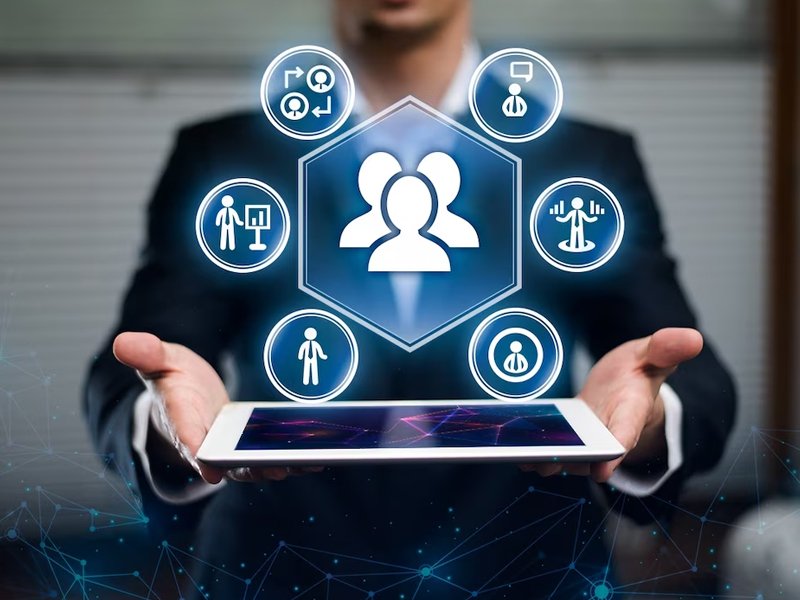
Artificial intelligence is increasingly shaping how businesses operate across industries. As AI adoption accelerates, companies need to judiciously optimize practices and strategies with this powerful technology. A thoughtful, human-centric approach can help unlock immense value through efficiency and innovation. This blog discusses how AI transforms business models, functions, and competitive landscapes. It also offers best practices and considerations around responsibly integrating AI for sustained growth.
Significance Of Artificial Intelligence (AI) In the Business Landscape
Artificial intelligence is having a significant impact on businesses globally. AI is utilized across various industries to optimize operations and gain a competitive advantage. Some key ways AI is transforming the business landscape include:
Customer Service - Ai is helping businesses provide faster and more personalized customer support through chatbots and virtual assistants. Customers can now get instant answers to common questions anytime without waiting on hold. It has significantly improved customer satisfaction levels.
Data Analytics - AI allows businesses to quickly glean insights from massive amounts of data. AI analytics tools can detect patterns, predict outcomes, and recommend actions. It helps companies make smarter real-time decisions, reduce risks, and develop targeted marketing strategies.
Automation - Many repetitive and routine tasks that humans earlier did are now being automated using AI and robotics. It results in higher productivity and reduced costs for businesses. For example, Ai is automating back-office operations like data entry, invoice processing, tech support, etc.
Supply Chain Management - AI improves forecasting of demands and supplies. It enables companies to manage their inventory levels efficiently and optimize distribution strategies. AI algorithms can detect anomalies or disruptions early on and help businesses mitigate risks in their supply chains.
Recruiting - AI can scan thousands of resumes and candidate profiles to find the best talent match for openings faster than humans. It reduces time spent on sourcing, screening, and hiring while improving the quality of hires. Interview bots are also being used to conduct initial screening of candidates.
Artificial intelligence is revolutionizing businesses' operations by enhancing efficiency, driving innovation, and empowering smarter data-driven decisions. It will continue to transform and optimize business practices in the coming years massively.
How AI Is Revolutionizing Traditional Business Models
Artificial intelligence is enabling the transformation of various traditional business models. Ai is helping companies evolve from standardized product-based offerings to customized, personalized solutions. Some key ways conventional business models are being revolutionized include:
On-demand Services - Ai has empowered on-demand, on-call service models like Uber, DoorDash etc. Thanks to AI-powered platforms, customers expect everything from travel to food delivery at the tap of a button.
Subscription Services - Many businesses now offer customized subscription packages to customers instead of one-time product sales. Ai helps create targeted packages based on user preferences and behavior patterns.
Product as a Service - Companies are moving from outright product sales to usage-based 'product as a service' models. Customers pay for value derived from the development instead of ownership. It helps companies build recurring revenue streams.
Freemium Models - Many apps and services use freemium models where essential functions are free and advanced tools require a subscription. Ai analyzes user behavior to personalize and improve freemium strategies.
Ai is helping companies rethink their revenue models, forge new customer relationships, and unlock more excellent business value by innovatively transitioning from product-focused to solution-based models. This transformation leads to higher customer stickiness and retention in the long run.
Benefits Of Optimizing Business Practices with Ai
There are immense benefits for businesses that thoughtfully optimize their practices and strategies with artificial intelligence:
Improved Decision Making - AI augments human decision-making by analyzing vast data faster. It helps prioritize options based on projected outcomes. It leads to well-informed choices.
Cost Savings - Businesses significantly reduce expenditure using AI by automating manual tasks and gaining insights to cut wastage. Optimal resource allocation further slashes costs.
Enhanced Customer Experience - AI enables personalized customer journeys. It understands individual preferences to deliver seamless, convenient experiences that build loyalty. Satisfied customers spend more.
Increased Revenues and Profits - Hyper-personalization, precise targeting, and optimized operations powered by AI directly impact top and bottom lines. Repeated customers and entry into new markets augment revenues.
Competitive Advantage - Early AI adopters gain unmatched market understanding and innovation abilities. Data-driven foresight helps blunt competitor threats and seize new opportunities.
Risk Management - AI algorithms discover risks and predict failures. Strategies adapt autonomously to challenges like demand fluctuations, fraud, and errors - reducing uncertainties.
Talent Augmentation - AI collaborates with and enhances human skills instead of replacing jobs. It frees talent from routine tasks into more stimulating work that stimulates employee morale and performance.
Strategies For Optimizing Business Practices with AI
There are specific strategies that businesses can adopt to optimize their practices with AI thoughtfully:
Define Objectives - Identify critical problems and metrics of focus to ensure AI solutions deliver measurable gains.
Cross-functional Teams - Bring data scientists, managers, and domain experts together for a holistic approach tailored to organizational needs.
Start Small - Pilot high-impact AI use cases requiring less data before scaling to enterprise-wide projects. Build from successes.
Integrate with Existing Systems - Design AI capabilities to plug seamlessly into current tech infrastructure for easy adoption.
Focus on Augmentation - Design AI to be helpful assistants that empower humans instead of replacing jobs to gain employee acceptance.
Reskilling Programs - Upskill workforce with AI literacy so talent can collaborate effectively with new technologies.
Change Management - Address organizational, process, and people challenges with change strategies to achieve cultural transformation.
Govern Responsibly - Establish accountability and controls to ensure fair, unbiased, and privacy-compliant AI decisions.
Measure Impact - Gauge improvements clearly through metrics to prove value, gain support for further investments, and refine strategies.
With the proper focus on impact, integration, and change management - AI can exponentially boost business performance when optimized judiciously.
Future Trends and Innovations
As AI evolves rapidly, many new technologies will emerge that will change how businesses operate. One area that will see significant growth is machine learning. ML advancements will allow AI solutions to become more personalized and autonomous. Systems will learn from vast amounts of new data and require less human training and supervision. This self-learning ability will optimize processes even further.
Another emerging trend is the integration of AI with technologies like robotics, IoT, blockchain, and more. When combined, these collections of technologies become far more powerful. For example, AI and robotics are already being blended to automate complex manufacturing and logistical tasks. The fusion of AI with other exponentially advancing technologies will drive unprecedented levels of automation across all industries.
As AI infuses every business function, the data generated will rise exponentially. Technologies like edge and fog computing will help analyze and extract valuable insights from data in real time. It will birth new intelligent systems and cognitive apps that can take autonomous actions. Advanced analytics like predictive modeling will evolve to anticipate solutions before problems arise. Integrating AI throughout entire business ecosystems will optimize operations like never before.
In the future, AI will interact more naturally with humans through creativity aids, personal intelligent assistants, and even intelligent twins. Such personalized AI services will optimize workflows seamlessly based on individual workstyles and preferences. They'll elevate employee and customer engagement to foster new productivity, innovation, and satisfaction levels. The synergistic partnership of human and AI capabilities presents limitless opportunities for organizations worldwide.
Challenges And Ethical Considerations
While AI holds tremendous potential, businesses must address several challenges to optimize it responsibly. One major hurdle is obtaining quality datasets for training algorithms. With representative data, AI systems can reflect the biases of their creators. It can disadvantage marginalized groups. Companies need strategies to source diverse, unbiased data.
As AI makes complex decisions autonomously, its internal logical process remains opaque. This lack of explainability can erode user trust and acceptance. Governments worldwide are now mandating "explainable AI." Businesses must ensure their AI can justify outcomes to stakeholders. They also need oversight on how AI impacts jobs, skills, and economies.
With AI taking over cognitive work, many occupations are at risk of redundancy. It causes ethical concerns around job disruption and increasing inequality. Companies should adopt "augment, not replace" approaches. They can retrain workers and enable seamless AI-human collaboration to create new high-skill jobs.
As AI systems interact extensively with users, privacy also emerges as a challenge. Data and insights collected could be misused or stolen without consent. Strong privacy laws and responsible practices like anonymization, transparency, and data minimization during AI optimization are needed.
Conclusion
When utilized judiciously, AI holds great potential to boost organizational performance massively. But its optimization also requires carefully addressing technical, economic, and social realities. Businesses focusing on explainability, life-long learning, job augmentation, and ethical governance will be best suited to lead in the AI-driven future. Adopting a people-first mindset and collaborative human-AI model can deliver optimal outcomes for all stakeholders in the long run.


